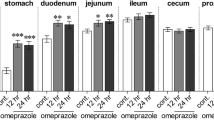Abstract
Exposure of the rat stomach for 10 min to 1 M NaCl produced an increase of luminal pH (alkaline response) with a concomitant reduction of the transmucosal potential difference (PD) and an increased generation of mucosal prostaglandins of E2 and 6-keto F1α. Prednisolone (3–50 mg/kg), given subcutaneously 4 hr before exposure to 1 M NaCl, dose-dependently inhibited alkaline response without affecting the PD reduction, and at 50 mg/kg completely prevented the increased production of mucosal prostaglandins after exposure to 1 M NaCl. The inhibitory effect of prednisolone on alkaline response was significantly antagonized by pretreatment with 16,16-dimethyl prostaglandin E2 (16,16-dmPGE2) (3 μg/kg) or cycloheximide (1.5 mg/kg). A repeated administration of prednisolone (3–50 mg/kg), once daily for 4 days, produced gastric lesions dose-dependently. At 50 mg/kg, gastric lesions appeared after administration of this drug for more than 2 days, and the inhibition of alkaline response caused by 1 M NaCl became more potent as the days of treatment increased. Either 16,16-dmPGE2 (10–100 μg/kg) or cycloheximide (1 or 3 mg/kg), given daily in two divided doses for 4 days, dose-dependently inhibited formation of gastric lesions in response to prednisolone (50 mg/kg). These results indicate that prednisolone inhibits gastric alkaline response caused by 1 M NaCl by reducing generation of endogenous prostaglandins. The weakened self-defense mechanisms caused by prednisolone may be involved in the pathogenesis of steroid-induced gastric lesions.
Similar content being viewed by others
References
Robert A, Nezamis JE: Histopathology of steroid-induced ulcers. Arch Pathol 77:407–423, 1964
Lancaster C, Robert A: Intestinal lesions produced by prednisolone: Prevention (cytoprotection) by 16,16-dimethyl prostaglandin E2. Am J Physiol 235:E703-E708, 1978
Jama RH, Perlman MH, Matsumoto T: Incidence of stress ulcer formation associated with steroid therapy and various shock states. Am J Surg 130:328, 1975
Gryglewski RJ, Panczenko B, Kobrbut R Grodzinska L, Ocetkiewice A: Corticosteroids inhibit prostaglandin release from perfused mesenteric blood vessels of rabbit and from perfused lungs of sensitized guinea pig. Prostaglandins 10:343–355, 1975
Swierczek JS, Konturek SJ: Gastric alkaline response to mucosa-damaging agents; Effect of 16, 16-dimethyl prostaglandin E2. Am J Physiol 241:G509-G515, 1981
Takeuchi K, Okabe S: Role of luminal alkalinization in repair process of ethanol-induced mucosal damage in rat stomach. Dig Dis Sci 28:993–1000, 1983
Svanes K, Takeuchi K, Ito S, Silen W: Effect of destruction of gastric surface epithelium by hypertonic NaCl on endogenous prostaglandins formation. Surg Forum 32:119–121, 1981
Nobuhara Y, Takeuchi K: Possible role of endogenous prostaglandins in alkaline response in rat gastric mucosa damaged by hypertonic NaCl. Dig Dis Sci 29:1142–1147, 1984
Jaffe BM, Behrnam HR, Parker CW: Radioimmunoassay measurement of prostaglandins E, A and F in human plasma. J Clin Invest 52:398–405, 1973
Orczyk GP, Behrnam HR: Ovulation blockade by aspirin or indomethacin;in vivo evidence for a role of prostaglandin in gonadotrophin secretion. Prostaglandins 1:3–20, 1972
Dayton MT, Kauffman GL, Schlegel JF, Code CF, Steinbach JH: Gastric bicarbonate appearance with ethanol ingestion; mechanism and significance. Dig Dis Sci 28:449–455, 1983
Tsurufuji S, Sugio K, Takemasa F: The role of glucocorticoid receptor and gene expression in the anti-inflammatory action of dexamethasone. Nature 280:408–410, 1979
Blackwell JG, Carnuccio R, Rosa MD, Flower RJ, Parente L, Persico P: Macrocortin: A polypeptide causing the antiphospholipase effect of glucocorticoids. Nature 287: 147–149, 1980
Robert A, Nezamis JE: Effect of prednisolone on gastric mucus content and on ulcer formation. Proc Soc Exp Biol Med 114:545–550, 1963
Menguy R, Masters YF: Effect of cortisone on mucoprotein secretion by gastric antrum of dogs; pathogenesis of steroid ulcer. Surgery 54:19–27, 1963
Eastwood GL: Effects of ulcerogens on gastroduodenal epithelial proliferation. In Mechanisms of Mucosal Protection in the Upper Gastrointestinal Tract, A. Allen, G Filemström, A Garner, W Silen and LA Turnberg (eds). New York, Raven Press, 1984, pp 27–32
Robert A, Nezamis JE, Lancaster C, Hanchar AJ: Cytoprotection by prostaglandins in rats. Gastroenterology 77:433–443, 1979
Robert A, Nezamis JE, Lancaster C, Davis JP, Field SO, Hanchar AJ: Mild irritants prevent gastric necrosis through “adaptive cytoprotection” mediated by prostaglandins. Am J Physiol 245:G113-G121, 1983
Main IHM, Whittle BJR: The effects of E and A prostaglandins on gastric mucosal blood flow and acid secretion in the rat. Br J Pharmacol 49:428–431, 1973
Bickel M, Kauffman GL: Gastric gel mucus thickness; effect of distension, 16,16-dimethyl prostaglandin E2 and carbenoxolone. Gastroenterology 80:770–775, 1981
Konturek SJ, Radecki T, Brozozowski T, Piastucki I, Dembinski A, Dembinska-kiec A, Zmuda A, Gryglewski R, Gregory H: Gastric cytoprotection by epidermal growth factor; role of endogenous prostaglandins and DNA synthesis. Gastroenterology 81:438–443, 1981
Author information
Authors and Affiliations
Rights and permissions
About this article
Cite this article
Nobuhara, Y., Ueki, S. & Takeuchi, K. Influence of prednisolone on gastric alkaline response in rat stomach. Digest Dis Sci 30, 1166–1173 (1985). https://doi.org/10.1007/BF01314052
Received:
Revised:
Accepted:
Issue Date:
DOI: https://doi.org/10.1007/BF01314052




